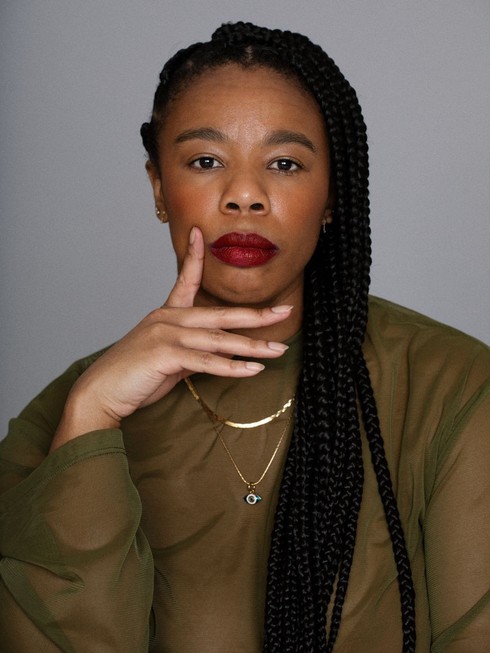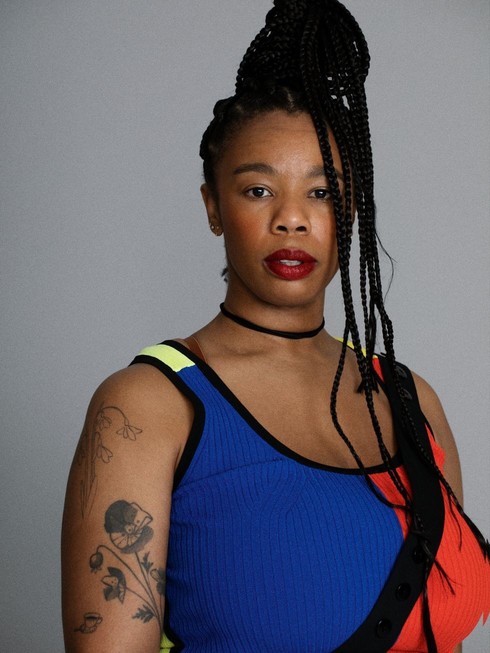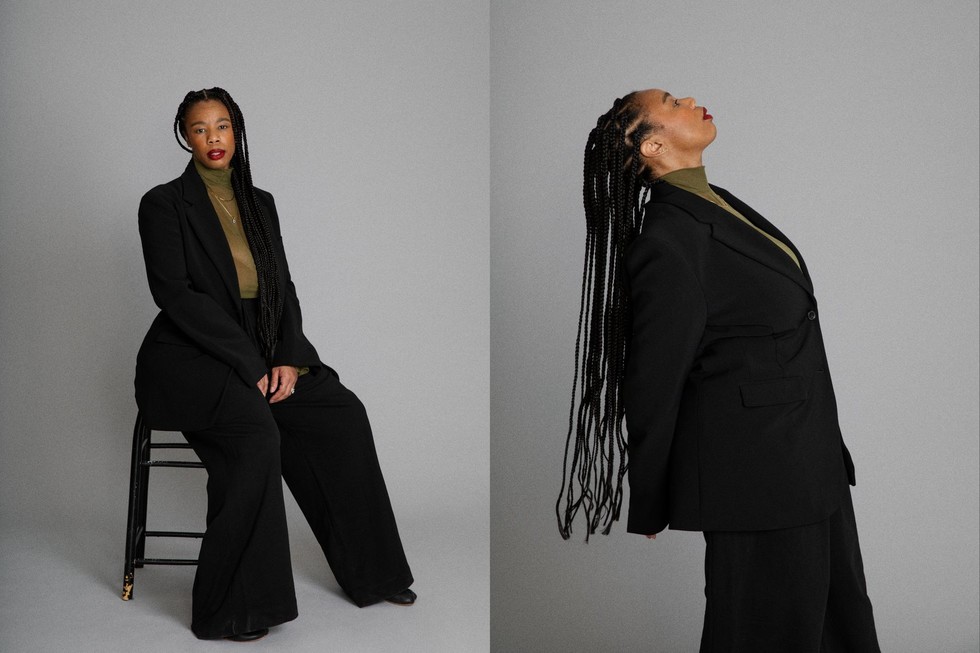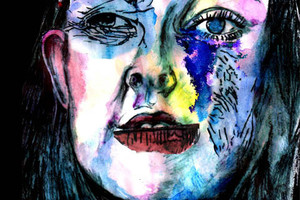“It’s Our Time to Be Nurtured”: How Mia Bonhomme Is Creating a Haven for Black Women in Stockholm
Written by Rosel Jackson Stern by Emelie BodénIn 2020, Mia Bonhomme took a chance. She rented a yoga studio in Stockholm at the height of the pandemic and 12 Black women, who didn’t know each other, showed up. As they dropped in, each person was greeted with the bright smiles and warm familiarity of seeing a long-lost cousin. “Oh, do y’all know each other?” Mia asked one of the participants. “No, we don’t, we’re just happy to see each other” they replied. This is when Mia knew she had stumbled upon something special. “All I wanted was for a Black girl to walk into a room and five other Black girls to say: ‘Hey!’ It’s something we do without thinking back home”, she explains, “I didn’t know how much it fed my soul until it stopped happening to me.”
This sense of connection, of kindred spirits, of community, is inherent to Mia’s origins in Mobile, Alabama. She grew up in all Black communities and the gifts therein. “It’s the feeling of being seen and immediately identified. There is safety in that” she reflects in a dingy but delicious sushi restaurant in Stockholm. Having moved here in 2018, Mia struggled to feel like she belonged in a culture so far from where she came from. “In the States, when you see another Black person, you always give them the nod,” Mia explains, “You throw positive energy their way.”
Upon arriving in Sweden, she quickly realised she was a far cry from her home town. “People would always tell me that Black people [in Sweden] don’t really get together like that” Mia explains when recounting her experience. When she would walk down the street, see a fellow Black girl with cute braids and let her know, the person would always look at her in confusion. Repeatedly losing this sense of connection with other Black women in a new country confused her. “It makes you feel like you don’t know how to operate in the culture you’re in”, she reflects. Despite meeting a community of mostly expat American Black women, Mia felt lonely. Sweden’s been ranked one of the worst places on the planet for making new friends by InterNations. We’re one of the world’s most individualistic countries, according to the global research project the World Values Survey (WVS) and over half of all households consist of a single person, according to Eurostat. On top of that, these stats don’t reflect the impact of systemic racism in workplaces, dating scenes and public spaces. Sweden can be a lonely place.
Where many of us would conform and make do, Mia went against the grain. “There’s no way Black people don’t kiki here. I refuse to believe it” she states, eyes twinkling. And she’s right. Afroswedes have been living full and rich lives in Sweden since at least the 70s, organised politically and socially through initiatives like Afrosvenskarnas Riksförbund and Black Coffee and made their mark in arts and culture. As an immigrant, it can be difficult to find these spaces and traditions. When I ask her where this tenacity comes from, she giggles with a sense of mischief. “I will ask the same question five times in different ways to get the answer that I want. I’ve been like that my whole life.” When speaking to Afroswedes around her, Mia started to understand that the will to connect was there. It just needed an outlet.
The yoga class she set up in 2020 was a huge success. It became the first Altar Space event, the start of a separatist collective for Black women in Stockholm. It’s a chance for the community to get together for wellness events like yoga, reiki and book clubs. “It’s not just a network,” Mia explains, “There needs to be more — someone tasked with making sure we meet up, hug on each other, read together and yell on each other's kids. That’s a job.” Altar Space could just be a group chat but Mia has built a tangible way for Black women to show up for each other.
I’ve felt this personally, from Mia and the wider Altar Space community. During my first art show, I was so nervous to put myself out there. I had mentioned it at one of the Altar Space events and Mia jumped into action. She sent out emails to all the Altar Space members and low and behold, my show was filled with beautiful and loving people cheering me on. “We are going to pull up,” Mia states as I recount how special that memory is to me. She shows me a photo from the show, now on the Altar Space official website. I scream in joy, much to the dismay of the white couple also sitting in the restaurant.
The urgency of this work is not lost on Mia. When I ask about the labour of love I and many of my peers have enjoyed, she says: “It is 100% rooted in Blackness, in Black women and femmes and my life experience. I’ve always needed a Black feminine nurturer.” A study from 2014 that Afroswedes are the minority most likely to be subject to racially motivated physical violence in public places. As of 2022, anti-black hate crimes are the second most common type to occur. Anecdotally, workplace discrimination and burnout are not uncommon experiences in our community. “A lot of us grow up without safety”, Mia reflects.
In light of this bleak reality, separatist spaces like Altar Space are needed more than ever. “It’s our time to be nurtured,” Mia says. This community isn’t simply about staying in touch but playing an active role in each other's lives. For Mia, community is about building an ecosystem with all the reciprocity that life needs to sustain itself. This means encouraging growth beyond each event. “I can bring us together for an after-work every quarter”, she points out, “but are you following up? Are you meeting up? Are you checking on each other's kids?” Altar Space centralises the mechanics of care, of checking up on our peers in an intimate and meaningful way. Being in a community is not an easy task, especially in Sweden. Loneliness coupled with an individualistic and anti-black culture makes community building an intentional practice.
While rewarding, this work comes at a price that Mia is keenly aware of. There is joy in providing people with a much-needed community space. Equally, the stress of managing people's expectations, setting up logistics and finances takes its toll. “Making sure is exhausting,” she admits, “A lot of the time I’m exhausted but fueled by people's gratitude and connection.”
Separatist spaces are not free. Activities cost money, especially when it’s a space for only Black women. “If we’re gonna kiki, we need to pay for that”, Mia laughs. A child of COVID-19, Altar Space was born out of a need to feel connected. “When it comes to asking for anything back, I haven’t been able to figure out a model for that that doesn’t leave me with guilt. That is a personal problem of mine,” she says.
A woman of persistence, Mia is learning how to nurture herself as well as her community. “I do have a very toxic trait where I only give and I become depleted very easily,” she reflects. It was important for Mia that she was able to pay for any help she received and she set very clear boundaries with her now assistant Zoe Bergvall. She is taking care of herself in real ways by quitting an unfulfilling job, investing in therapy and setting aside time for herself. “I wanna figure out what a me era looks like,” she says. This feels like a significant shift because love and being loved is how we stay sane.
As we leave the restaurant, it’s clear that Mia knows how to love in extraordinary ways. It shows up in her insistence that she pay for my meal, the advice she gives me about an important business meeting and the warmth with which she hugs me goodbye. For me, she continues a the legacy of love of Black women in my life have blessed me with. It’s a deep, considerate and fortifying love. It’s a love that shows up, that puts you on and puts you back together when life breaks you apart. It’s a lineage of love that’s set the pace for how I want to contribute to this world.









